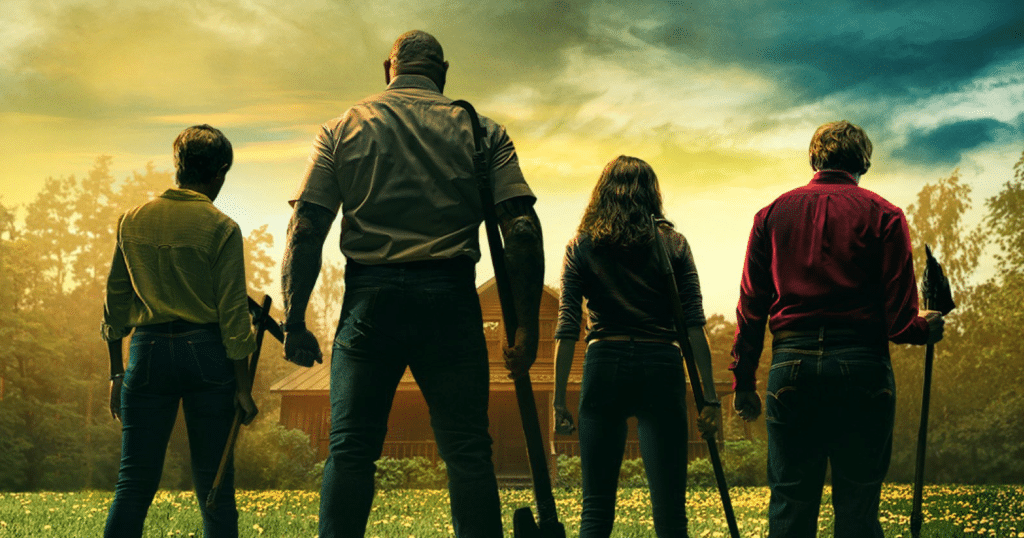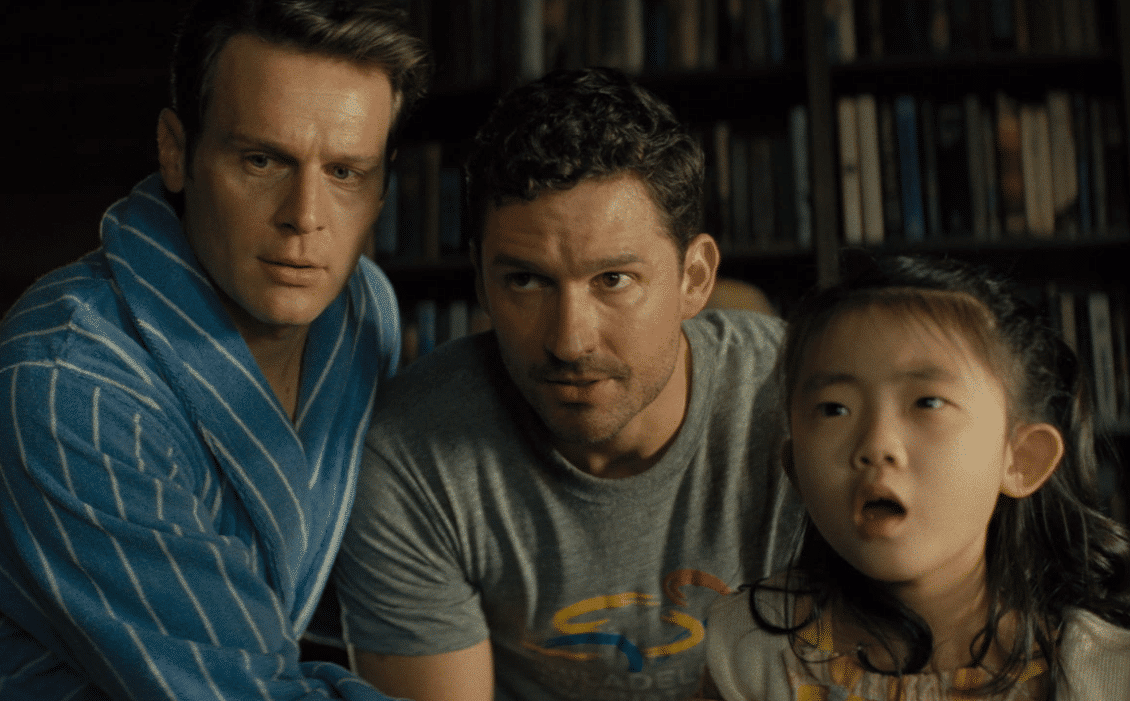
By contributor Gabby Foor
Do you even bother to answer the door anymore? The same way we can screen calls, a knock on the door is an antiquated thing. Many of us would pretend we aren’t home to avoid the awkward interaction with a political flier or a Jehovah’s witness, but what if no isn’t an option?
Director M. Night Shyamalan is no stranger in attempting to end the world, but usually the attempt is more disastrous than an actual apocalypse. Anyone that can recall The Happening and After Earth could recollect the ineffective and underwhelming attempts to jolt the viewer with the larger-than-life existential concept of our inevitable permanent termination. Both movies were poorly executed and ultimately forgettable. Knock at the Cabin takes away the upfront disaster elements that generally pervade our director’s work with heavy action or overdone visuals, and replaces them with a human element of danger, spiritual undertones, wavering trust, and an impossible choice for a loving family.
With beautiful, crisp camera work, we take in a cabin and its serene natural surroundings. Innocently planted at its center is a child, Wen (Kristen Cui), collecting grasshoppers. It doesn’t take long before she is interrupted by what we are constantly warned as a child to avoid: a stranger. Clad in a crisp white shirt and moving gingerly through the trees, Leonard (Dave Bautista) approaches the girl with the promise that he only wants to be friends. But when a game of trust makes Wen uncomfortable and three other strangers are seen lurking just beyond the tree line, Leonard makes his first play at telling Wen that she will have to let him and his associates in to the cabin to speak to her family, or they will find their way in any other way they must.
Off the bat this is a pretty unconvincing way to find your way in anywhere, by scaring a family’s child. But Wen, returns to her two fathers Eric (Johnathan Groff) and Andrew (Ben Aldridge), who are taken aback when Leonard makes it known they don’t wish the family harm, but that he does not wish to converse through a closed door. The family scrambles to barricade as Leonard and his three associates (Rupert Grint, Abby Quinn, and Nikki Amuka-Bird) work their way in with handmade “tools” that look a lot more like weapons. Once the house is breached, the four settle in, binding the family to chairs, to finally say their piece: they have seen visions of the apocalypse, this cabin, these woods. One person in this family must die; the family must choose their sacrifice and follow through; suicide is not an option and there is no turning back. This choice must be made to save all other life on the planet.
While grappling with the idea of this choice and the possibility that they are being targeted as a same sex couple by a group with an agenda, Eric turns inwards emotionally while Andrew lets the lawyer in him go on the offensive, railing against the reasoning of their captors. They refuse their offer, saying they would wander a barren earth instead of making a sacrifice. The way the story flashes back in time over the course of the movie shows each choice and each sacrifice these two men have had to make to be together and have a family, making everything they have even more precious, so no one can blame them when they refuse. But once they have rejected the choice, a shocking act of violence unfolds in the cabin, and deadly tsunamis and earth quakes rip across the country.
The problem with this group of believers is they knowingly, and for no good reason, sow doubt in their captives and the audience. Is this a religious faction? Is this family being targeted over incidents from the past? Is this manipulated media? But the story never lets itself go too far towards truth or fiction in order to establish the family in the cabin, or its audience, firmly in either scepticism or believing in its invaders’ decrees. I enjoyed the idea of the “unseen” elements of what is going on – not only in the world outside but in the moments of brutality within the cabin that show themselves in horror and nausea on the witnesses’ face and don’t need to be played out for excess drama. This is a human story after all, and the director never robs us of that with gratuitous violence.
The performance that steals the show, in my opinion, is that of Dave Bautista. Leonard is a second-grade teacher from Chicago with gentle mannerisms, an awkward way about him but a genuine benevolence that can’t be dismissed as dishonest. Bautista’s empathy and devotion to the character’s broken-hearted mission and conflicted remembrance of his simple life, filled with basketball games and the laughs of children, is enough to sway the audience to his side more than once. Among the four home invaders, Bautista stands among them as a timid but stoic presence, pressing a questionable undertaking of violence that could never seem to suit his forgiving, modest presence.
As we walk away from another M. Night original, I’ll say I’m not disappointed. I haven’t been able to guess the ending to a decent twist to one of his films since The Visit, and he hasn’t been able to get as close to successfully ending the world as now. There are plenty of things wrong in this beautifully-shot love story to family and the overarching fear of losing what is ours, including plot holes, narrative inconsistency and some scenes that won’t pack a punch for those viewers hoping that the R rating might bring more blood-spilling chills. However, I think Knock at the Cabin is a perfectly watchable entry in Shyamalan’s filmography and I’d like to see if you can get what he’s playing at, too.
Knock at the Cabin (2023) is available from Amazon Prime and other outlets now.
